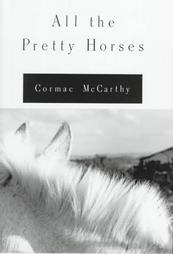John Grady Cole is a sixteen year old rancher, living and working on his grandfather's ranch is all that he's ever known. When his grandfather dies, leaving the ranch to his mother, who insists on selling it, he is unmoored, alienated from his former life, and sets out with his friend Lacey Rawlins across the Mexican border looking for work and a new life. They are accompanied by a young stranger, calling himself Jimmy Blevins--probably a fake name, taken from a popular radio show host--who seems to be another runaway, but who is more anxious and immature than John Grady and Rawlins, and less capable.
The Mexican landscape these men--boys, really--explore is beautifully and carefully portrayed by McCarthy. It's a mysterious, unfamiliar land, only a day's ride from their Texas home but culturally and spiritually distant. It offers luxury and satisfaction, as on the hacienda where John Grady finds work as an expert in horses, but also the threat of violence and death. Like in all of McCarthy's works, these twin evils are part of the unknowable, unchanging nature of the universe:
In history there are no control groups. There is no one to tell us what might have been. We weep over the might have been, but there is no might have been. There never was. It is supposed to be true that those who do not know history are condemned to repeat it. I don't believe knowing can save us. What is constant in history is greed and foolishness and a love of blood and this is a thing that even God--who knows all that can be known--seems powerless to change.
(How's that for a reflection on the week of Trump's election?) And yet All the Pretty Horses is, surprisingly for McCarthy, a conventional kind of love story. John Grady falls in love with the beautiful Alejandra, the daughter of the rich haciendado who employs him. They can't be together, of course, and McCarthy's paratactic style, like the love child of Ernest Hemingway and Raymond Carver, is surprisingly well-suited to capturing the bittersweetness of this well-worn story:
They stood on the platform and she put her face against his shoulder and he spoke to her but she did not answer. The train came huffing in from the south and stood steaming and shuddering with the coach windows curving away down the track like great dominoes smoldering in the dark and he could not but compare this arrival to that one twenty-four hours ago and she touched the silver chain at her throat and turned away and bent to pick up the suitcase and then leaned and kissed him one last time her face all wet and then she was gone. He watched her go as if he himself were in some dream. All along the platform families and lovers were greeting one another. He saw a man with a little girl in his arms and he whirled her around and she was laughing and when she saw his face she stopped laughing. He did not see how he could stand there until the train pulled out but stand he did and when it was gone he turned and walked back out into the street.
In fact, McCarthy's idiosyncratic style--which is perfectly attuned, here, to the numbness of loss--struggles sometimes with the sturm und drang of his moral philosophy. Sometimes, he reaches too far, and ends up sounding silly, like a parody of himself:
The browsing horses jerked their heads up. It was no sound they'd ever heard before. In the gray twilight those retchings seemed to echo like the calls of some rude provisional species loosed upon that waste. Something imperfect and malformed lodged in the heart of being. A thing smirking deep in the eyes of grace itself like a gorgon in an autumn pool.
A Gorgon in an Autumn Pool--the new album by Necromancer, in stores Friday.
But McCarthy is more versatile than he gets credit for. The arguments between Rawlins and Jimmy Blevins, whose childishness is written with glee, are funny and charming. Elsewhere, as in the long stretch where John Grady must navigate the dangers of a Mexican prison, or a character's assassination at the hands of rural police, McCarthy is as chilling and unsettling as his reputation suggests. Mostly, All the Pretty Horses succeeds because, unlike the apocalyptic dreamscapes of Blood Meridian and The Road, it's a small, believable, human story.


4 comments:
I loved this one in high school. MIght be time to revisit. Also A Gorgon in an Autumn Pool is Patricks 27th studio album.
Chloe, did you read the sequels?
I read the Crossing and then gave up on Cities of the Plain, but I I'm willing to try again. I just really enjoyed No Country for Old Men, and I'm teaching The Road this year...
You're teaching The Road? Whoa.
Post a Comment